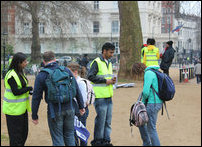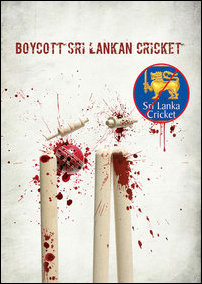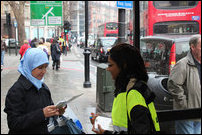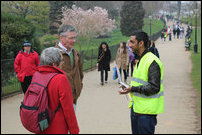
Rudra faction ‘expels’ democrats of TGTE
[TamilNet, Wednesday, 30 March 2011, 11:26 GMT]Using as context the quarter final of the Cricket World Cup between co-hosts Sri Lanka and England, the TYO-UK (Tamil Youth Organisation) on Saturday conducted an awareness campaign on Sri Lanka in London, on a day marked by huge protest by the TUC (Trade Union Congress) against public spending cuts. As up to a reported 500,000 demonstrators marched through central London, TYO members on the periphery handed out leaflets and gathered signatures for a postcard campaign calling on the England and Wales Cricket Board (ECB) to boycott Sri Lanka as a sporting partner. The effort is part of a wider campaign to encourage international boycott of Sri Lanka as a tourist destination and as a producer of goods, TYO said. The Sri Lankan cricket team is due to tour England this summer.
“South African sporting teams were shunned by the world during the apartheid era, and in 2008 the ECB cancelled its tour of Zimbabwe due to concern over ongoing human rights abuses.” said Brinthy Skanthatheva, one of the organizers of the campaign.
“It is repugnant that a team representing Sri Lanka, a state which has slaughtered over 40,000 civilians in the space of a few months [in 2009], is allowed to play in England.”
TYO activists fanned out throughout the West End of London, from Knightsbridge where they lobbied shoppers outside Harrods luxury department store, to Hyde Park, where the TUC rally was taking place and the main thoroughfare of Piccadilly.
The activists said they received positive feedback from the general public, including many crickets fans amongst the marchers..
“Of course we support England. We are British and Tamil, none of us would even dream of supporting Sri Lanka [in the tournament]. We have nothing to do with a Sri Lankan identity,” Ms. Skanthatheva told reporters awaiting the address to the TUC rally by main opposition Labour Party leader Ed Miliband.
Asked if it was appropriate to mix sports and politics and to censor sportspeople for their governments’ conduct, Ms. Skanthatheva, referring to the examples of Apartheid South Africa and Zimbabwe, replied that historically sports boycotts have been powerful signals to repressive states of international rejection of their abuses.
“Sport and politics are inseparable. Above all else, sports events legitimise a country. It promotes the perception that the country is without problems [and that] its government’s conduct is acceptable by international standards.”
“Sport is not just a past time. We cannot protest about war crimes against civilians one minute and cheer for sports teams from that state next. Is it right to welcome sports teams representing Libya to international sports fora today?”
Participants at two other demonstrations on Piccadilly in support of pro-democracy movements in Libya and Syria respectively, signed postcards and added TYO’s ‘Boycott Sri Lanka’ placards to theirs, TYO activists said.
Ms. Skanthatheva said the TYO was under no illusion about the difficulty in organising a sporting boycott, but was undeterred. She referred to the long struggle for this against Apartheid South Africa.
“A handful of South African activists first began agitating for a boycott of goods and sports in the early sixties, but especially amid the politics of the Cold War, international action only became reality in the seventies, and then only slowly,” she said.
“The world is a now a lot smaller than it used to be. And issues of human rights, state violence, and popular rights are at the forefront of international politics as never before.”
“And we are in it for the long haul,” the Tamil activist said.
Full story >>







